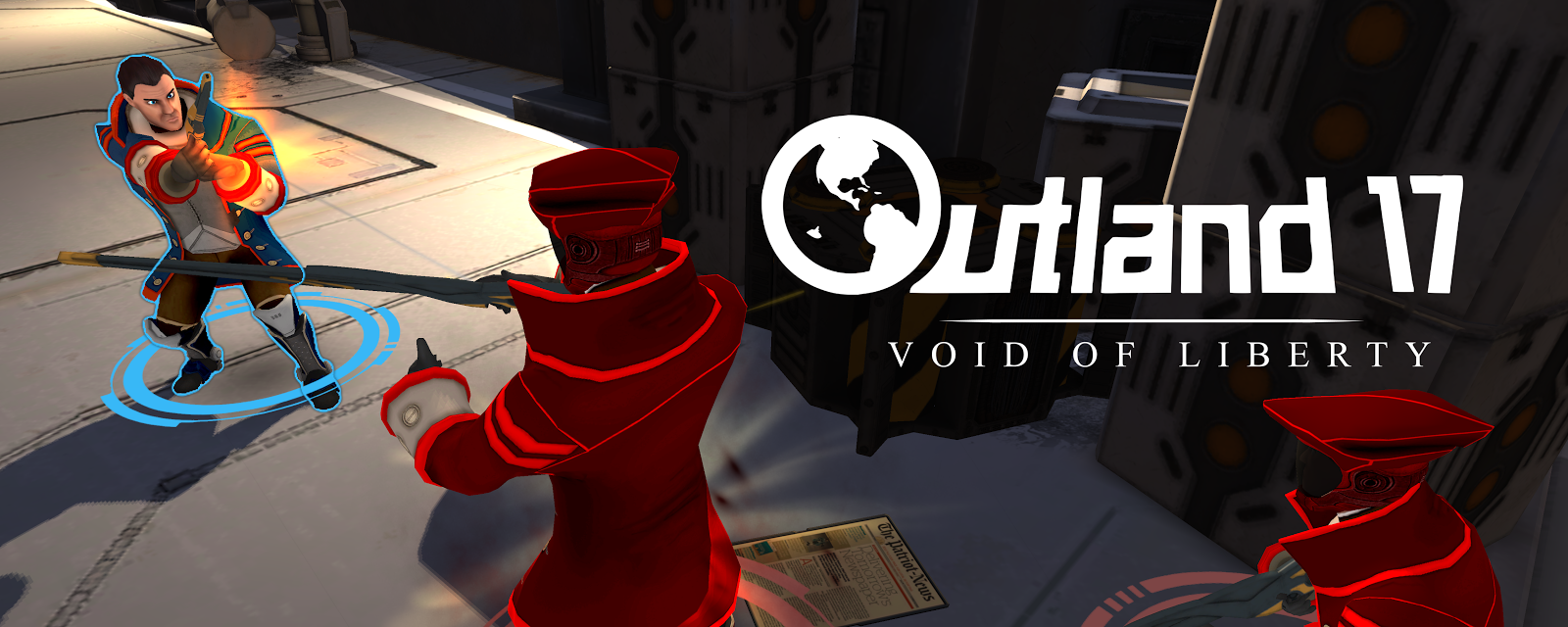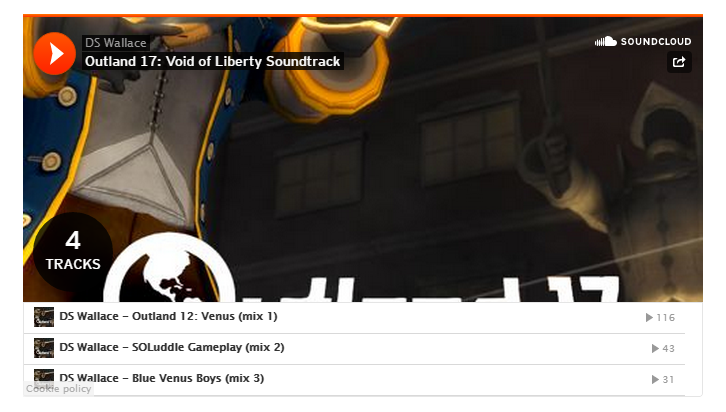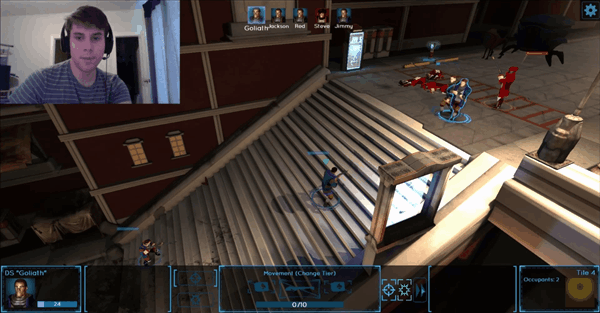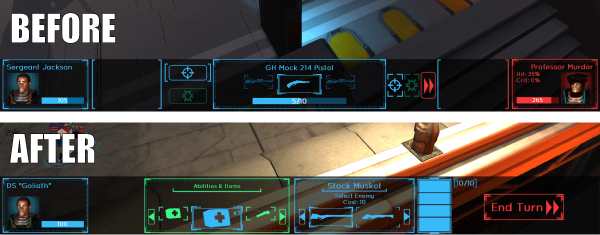Outland 17: Void of Liberty is a sci-fi Tactical RPG that's inspired by the American Revolutionary War. We are a brand new team, making our first game, working day jobs, side gigs, and even serving our country. Outland 17 has now been in development for more than 2 years. About a month ago we entered Alpha and began sharing our game with the public.
Currently we have one week left of our Kickstarter campaign. In the past, I saw Kickstarter only as a marketing effort - a way to raise funds and get publicity - but doing a crowdfunding campaign has also taught me a lot about game development. Hopefully, you can learn from our successes, and our shortcomings.

Include time for marketing and polish.
I've spoken with a lot of other indie developers who are ready to start their game, and they're excited about spending the next six months developing but they rarely make plans for two important aspects of development - polish and marketing.
You'll want to divide your resources into thirds. This means if you only have six months to make a game, you should spend two months on core development, two months on polish, and two months on marketing.
However, this doesn't mean you're going to power through development and then stop everything just to market your game. At the beginning, focus primarily on core development but keep a small portion of your time for marketing. Once in full development dedicate a third of your time for marketing. When you reach your crowdfunding campaign, the focus should shift to emphasize marketing.
It sounds simple, but if you take this to heart you can reduce scope creep and increase the chance of people actually knowing your game exists.
Practical ways to incorporate marketing into development.
Delagate Content Creation - Have everyone on your team take turns making marketable content specifically for different markets. Your team has multiple facets of experience that will appeal to a wide range of people and taking turns writing up development articles can keep production moving and keep bottlenecks from forming.
Each development article we've made focused on a specific aspect of our game and was written by the person with the most experience in that field. For example, our composer recently released new music for our demo. Along with sharing the soundtrack, he wrote a brief article about his process and how he developed his compositions to match the sci-fi/colonial setting.

Include examples of new work when uploading articles.
Consistently keeping up with these articles is key here. It may seem like a lot of work to make a new blog post about a change to a model or tweaks to a texture, but getting the chance for feedback and staying in front of the community is well worth it later on.
Let's Plays - Once we released our demo on Gamejolt, we started getting a lot of attention from small Let's Play channels. Up to this point, friends and family had been the only ones playing and providing critique. This source of feedback was informative, infuriating and exciting all at the same time, but most of all, this unfiltered stream of consciousness was priceless for development. We got to see what worked and what didn't.

Let's players showed some bugs we missed but helped make it entertaining.
There were times I wanted to reach through the screen and show people what they were supposed to click. This was an insightful feeling since it's not the player's fault if they don't know how to play the game, it's yours. Taking this, we identified what was wrong, created a new build addressing the issues, and shared it with the community again, perpetuating the cycle of feedback.
I'd highly recommend reaching out to people just starting their channel and ask them to play your game. This way you get honest feedback, but you don't have to worry about too many people seeing an unfinished product.
Challenges we encountered making a demo.
If you're aiming to have a demo released with your Kickstarter launch, make sure that it's at the forefront of your marketing. Advertise that you have a demo link on the Kickstarter page. Not only does it show that you have a working prototype but you're also offering something of value to backers as opposed to spamming your Kickstarter link for more funds.
When you post a new update on your Kickstarter, make sure to mention at the end any changes to the demo you have made. Include a changelog so people can see how development is going. This Kickstarter update should then be shared across other platforms you host devlogs on, such as IndieDB. Include shout outs/thank yous if there was someone who gave a particular suggestion to you, it helps to make them feel appreciated and that there's a real person on the other side.

In one update we included info about new upgrades to the GUI.
Keep User Experience In Mind Throughout Kickstarter - As you continue to develop your demo, fixing bugs and applying suggestions, don't lose sight of the experience you want the player to have. It can be easy to get carried away with balance changes, new content and more cowbell. These additional features can end up breaking areas of your game that you didn't anticipate.
Using ourselves as an example, we originally had created a three mission demo with just content enough that someone could get a feel for the game. However, people slowly requested more polish and more features. Over the course of a month, it went from a three mission demo with a hand full of abilities, to a nine mission, hour long demo. This had a very specific impact on the overall experience.
A mission we included to demonstrate destructible environments
Most let's players only played up to the first three levels so we didn't noticed that the experience started to fall apart seven or eight levels in. Eventually a streamer on Twitch played the entire demo live and we watched as they went through it.
Three major flaws became obvious as we watched:
- Leveling up was no longer balanced because you could max out the characters before the end of the game. Since we have a classless system where you level up through player actions, you could have characters with all the upgrades before the demo was done. This broke the experience where each character no longer felt unique especially if you equipped them with the same items. This could have been avoided by pacing out the leveling process to fit the new length of the demo.
- Loot was originally designed to be random. When playing only three levels it didn't matter what items they got because they wouldn't get to try them all in one run. But since you were playing longer with enough possible items for three missions, you could get stuck with level one items even in later missions. A fix for this would have been segmenting new upgraded items to be distributed at certain intervals during the demo.
- The final and most embarrassing issue was the fact that the last level crashed towards the last mission. When we did our testing, we didn't catch all the possible choices that came adding the extra mission and she just happened to pick the right combination that caused the game to crash. Had our demo not gotten too big, too fast, to effectively test for bugs, this could have been avoided.
How to maintain your use experience - Before you integrate feedback, consider how implementing it could affect your demo by asking yourself one important question: "Does adding this feature break something else in your game?"
If it does, consider how much work will it take to add this new feature and effectively bug test it. This new addition could add extra time to your workflow that you don't have. You never know when a "simple change" could snowball into more work.
Just my experience
I hope this article can better prepare you for Kickstarter. Don't be afraid to attempt a crowdfunding campaign, just do your best to be prepared and learn as much as you can along the way.
If you're going to take away anything from this article, take these 3 things:
1. Give equal importance to development, polish and marketing.
2. Dont lose focus of the big picture. Small changes on your demo can have a big impact.
3. Everything is interconnected. Use marketing to improve development and vice versa.
- JC Santiago, Producer (@GrenadeTree)
PS. If you're curious about our game, check out the Kickstarter. We have a brand new game trailer and updated demo you can try.




I always love these informative articles. Thanks for sharing :).
Really insightful stuff, as someone looking to kickstart in the coming months it was really helpful to read such honest writing, and your game looks really good.
I hope you plan to take a second pass at kickstarter if you don't make it.
@Protocol_games and @Talsmic I'm glad you liked the article. Make sure to say hell on Twitter @grenadetree
-JC
Thanks for sharing this invaluable information. Really like how you broke this down into a logical sequence and the fact that you addressed how important the polish and marketing components are to successful game development.